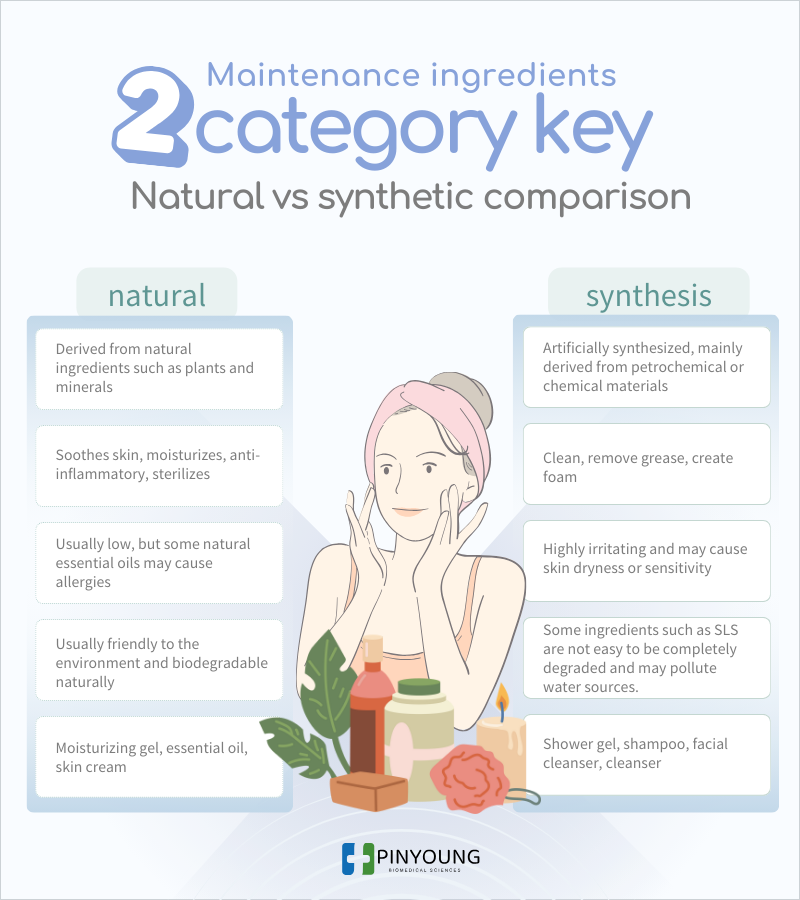Background and Controversy of Natural vs. Synthetic Ingredients
As consumers become more health-conscious and environmentally conscious, ingredient selection in skin care and cleaning products has become a hot topic.natural ingredientsSuch as tea tree oil and aloe vera, which are highly praised for their gentleness and natural origin. andsynthetic ingredientsSoap base and Sodium Lauryl Sulfate (SLS), although commonly found in cleaning products, have also raised questions about irritation and environmental impact. This article will compare the characteristics of these ingredients in terms of efficacy, safety and applicability to help consumers make more informed choices.

Core Differences Between Natural and Synthetic Ingredients
| project | natural ingredients(such as tea tree oil, aloe vera) | synthetic ingredients(such as soap base, SLS) |
|---|---|---|
| source | Derived from natural ingredients such as plants and minerals | Artificially synthesized, mainly derived from petrochemical or chemical materials |
| Main purpose | Soothes skin, moisturizes, anti-inflammatory, sterilizes | Clean, remove grease, create foam |
| irritating | Usually low, but some natural essential oils may cause allergies | Highly irritating and may cause skin dryness or sensitivity |
| Environmental protection | Usually friendly to the environment and biodegradable naturally | Some ingredients such as SLS are not easy to be completely degraded and may pollute water sources. |
| What products are common in | Moisturizing gel, essential oil, skin cream | Shower gel, shampoo, facial cleanser, cleanser |
Detailed comparative analysis - efficacy and safety
- Tea tree oil vs. soap base vs. SLS
- tea tree oil: Widely used in acne care and scalp cleansing products with its strong antibacterial and antifungal properties. Natural sources reduce chemical burden but may still pose a risk of irritation to sensitive skin.
- Soap base and SLS: These synthetic surfactants can quickly foam and remove oil, but long-term use may cause dryness or skin sensitivity. SLS, in particular, is considered to have the potential to damage the sebum membrane, leading to damage to the skin barrier.
- Aloe Vera vs. Synthetic Moisturizers
- Aloe Vera: Rich in polysaccharides and vitamins, has excellent moisturizing and soothing effects, often used for after-sun repair and sensitive skin care. But the natural enzymes in aloe vera can sometimes cause allergic reactions.
- Synthetic humectants (such as glycerin, propylene glycol): Although the moisturizing effect is powerful and stable, some synthetic ingredients may cause acne risks, and some consumers are concerned about their safety.
How to choose?
The choice of natural or synthetic ingredients depends on each individual's skin needs and product use situation:
- if you pursueGentle and natural care, tea tree oil or aloe vera products will be more suitable for you. But remember to get allergy tested first.
- if neededEfficient cleaningOr for oily skin conditioning, although synthetic ingredients such as SLS have strong decontamination capabilities, they are not suitable for long-term use.
- sensitive skinYou need to avoid highly irritating synthetic ingredients and choose products labeled as hypoallergenic.



